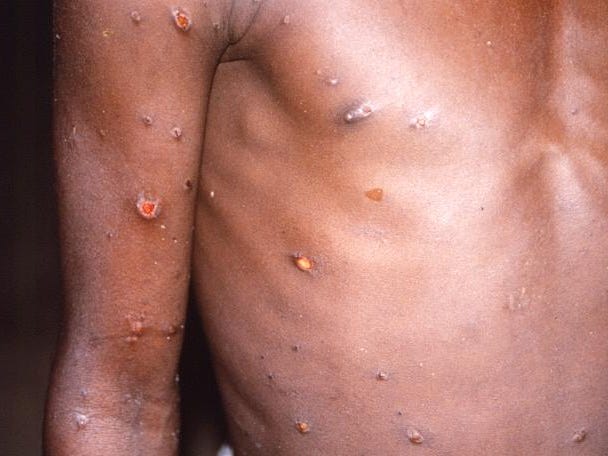- Monkeypox has been detected in the US, Australia and a number of European countries.
- It usually causes flu-like symptoms and puss-filled boils that get better within two to four weeks.
- Experts are urgently investigating why it is spreading in an unusual way outside of Africa.
Monkeypox — a rare disease usually found in Central and West Africa and those who have travelled there — has been detected in the US, Australia and a number of European countries in recent days in what has been described as an "unusual" spread.
On Friday morning, German and Australian officials were the latest to confirm cases, Reuters reported.
Those came after New York City health officials said they were investigating a "possible" monkeypox case on Thursday — the second infection in as many days after the first US case of 2022 was confirmed on Wednesday.
Jennifer McQuiston, the deputy director of the Division of High Consequence Pathogens and Pathology at the CDC's National Center for Emerging and Zoonotic Disease, told the Associated Press on Wednesday: "I do think we are preparing for the possibility of more cases."
Scientists are trying to understand why monkeypox appears to be spreading outside of Central and West Africa.
Monkeypox rarely spreads outside of Central and West Africa
As of Friday morning, monkeypox cases were confirmed in: the UK, the US, Portugal, Canada, Sweden, Australia, France, Italy, Germany, and Belgium.
The first known case of the current monkeypox outbreak was announced in the UK on May 7 in an individual who had traveled to Nigeria. Later cases had no link to the first case and had not travelled to where monkeypox is endemic. The total number of cases on Friday was 20 the UK Health Security Agency said.
A "notable proportion" of early cases were among those who self-identified as gay, bisexual or men who have sex with men, the UKHSA said on Friday.
Dr Susan Hopkins, UKHSA's chief medical adviser, described the spread in a statement as: "rare and unusual."
She said on Wednesday: "These latest cases, together with reports of cases in countries across Europe, confirms our initial concerns that there could be spread of monkeypox within our communities."
How does monkeypox spread?
Unlike COVID-19, which is highly contagious, monkeypox doesn't usually spread easily among people. Monkeypox spreads via large respiratory droplets when people are in close contact; direct contact with skin lesions or bodily fluids; or indirect contact via contaminated clothing or bedding.
It is not a known sexually transmitted infection, the UKHSA has said.
Symptoms include fever, backache and pus-filled boils
Most people that catch monkeypox have mild flu-like symptoms, such as fever and backache, and a rash that clears by itself within two to four weeks. The rash starts on the face and then spreads to other parts of the body, including the genitalia. The rash features boils that fill with pus and ultimately crust over and fall off.
It can be hard to tell between monkeypox and other common rashes such as chicken pox. Swollen lymph nodes are a hallmark feature of monkeypox, according to the World Health Organization.
Dr. Inger Damon, director at the CDC's Division of High-Consequence Pathogens and Pathology, said in a statement on Wednesday: "We're asking the public to contact their healthcare provider if they have a new rash and are concerned about monkeypox."
How dangerous is monkeypox?
The condition can be deadly in some cases.
The proportion of those with monkeypox that die from it ranges from 1% to 10% depending on the type, according to the WHO. The two strains are: the West African clade and Congo Basin clade.
UK health officials said on May 16 its cases were from the West African clade — and scientists from Portugal's National Institute of Health identified the same strain, according to sequencing released on Friday.
That strain is associated with a lower risk of death, of around 1%, according to Paul Griffin, associate professor of medicine at the University of Queensland, Australia.
Griffin said, while it is important awareness is raised, "there are several important considerations with this virus that mean we do not need to overreact. It is relatively hard to spread, and we already have great vaccines and potentially some treatments available also."
How is monkeypox treated?
Treatment for monkeypox is mostly supportive — as for a cough or cold, for example. Most people recover without treatment within a few weeks.
There is no specific vaccine for monkeypox, but the vaccine for smallpox can be used to control outbreaks.
According to the WHO, the smallpox vaccine can provide up to 85% protection against monkeypox, and people vaccinated against smallpox in childhood may experience a milder disease.
Britain is offering the smallpox vaccine to some healthcare workers to boost protection, Reuters reported.
Two antiviral drugs, called cidofovir, and tecovirimat can also be used to control outbreaks of monkeypox.

